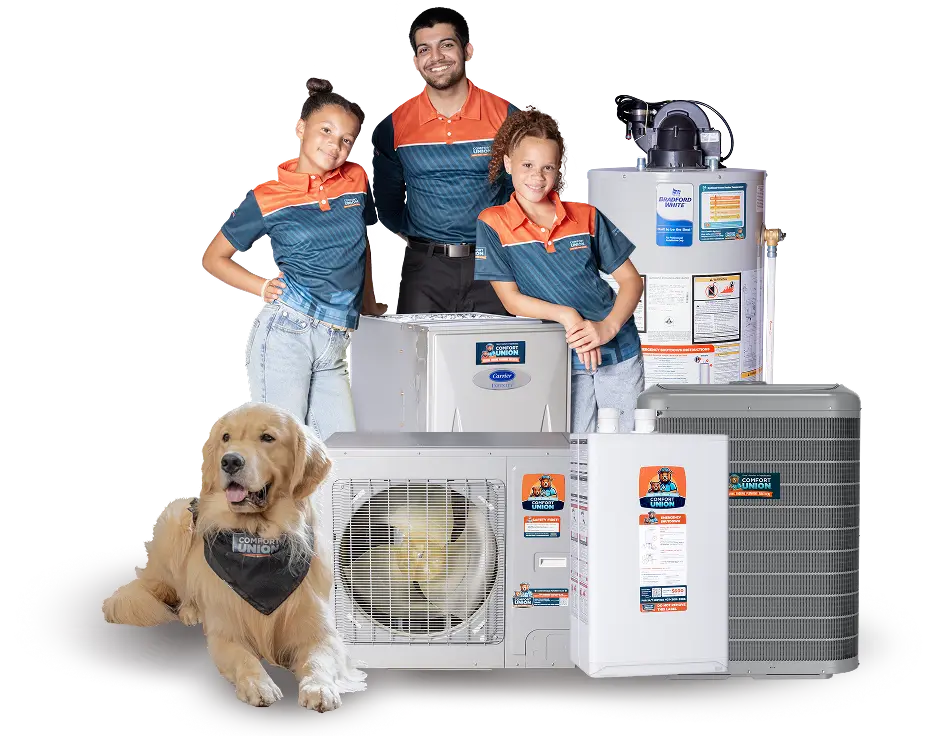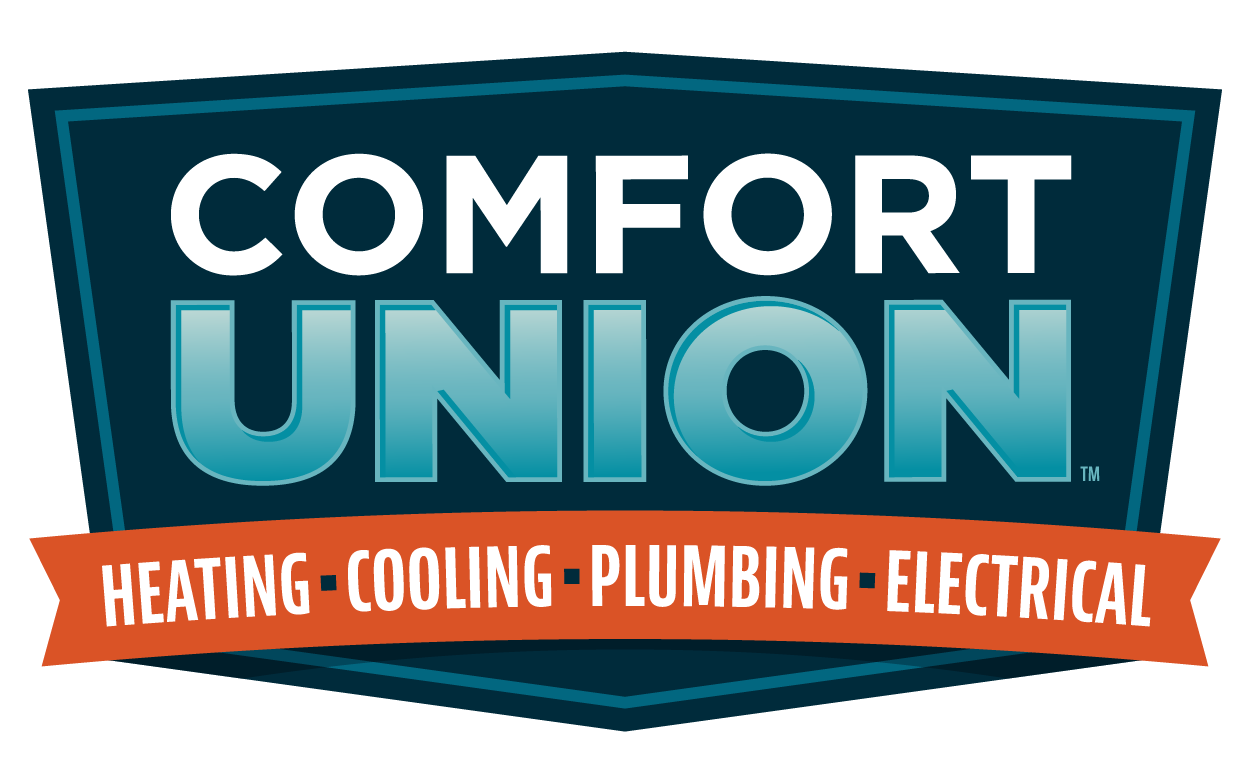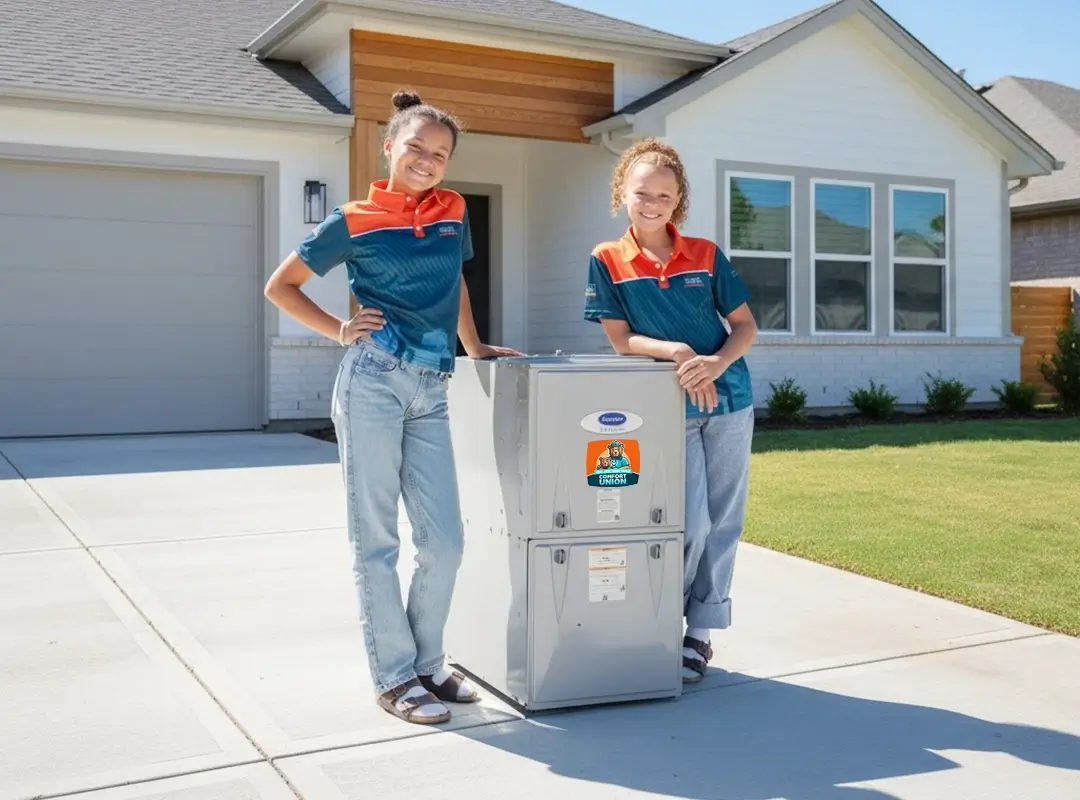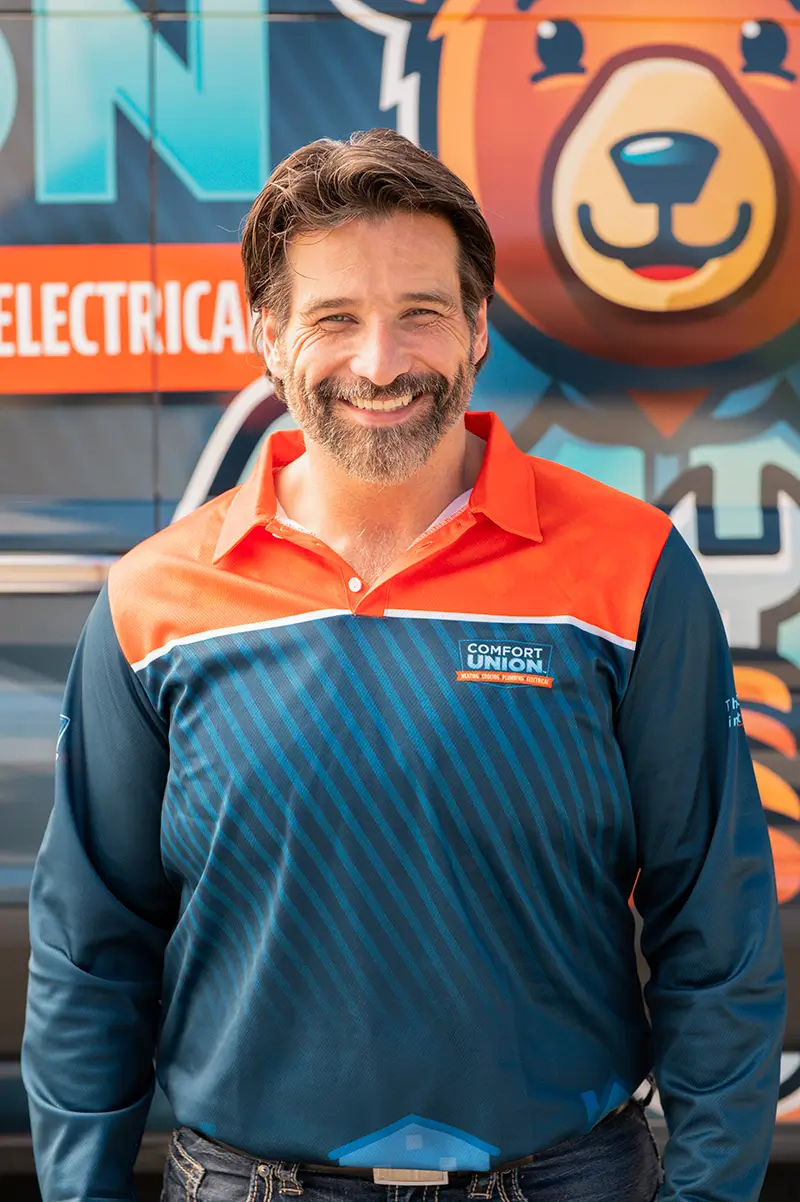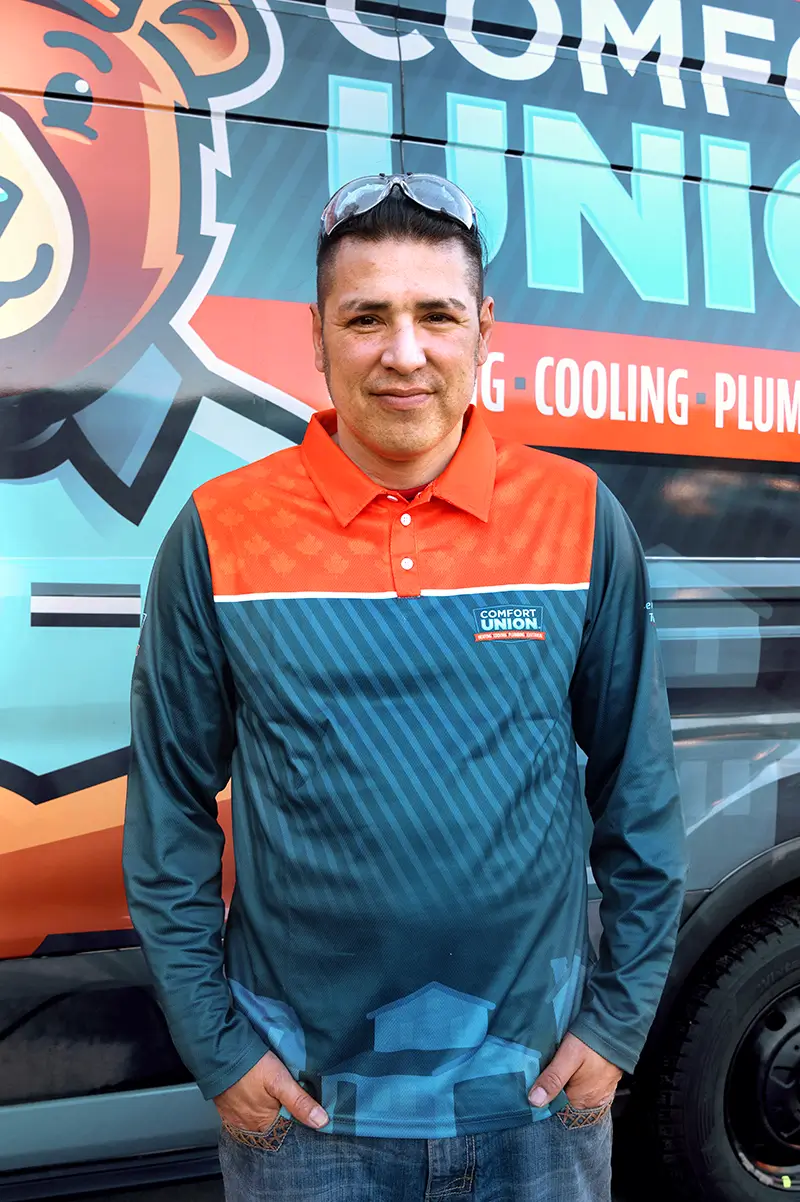Buying a furnace in Calgary is more than a home upgrade; it is essential for comfort and survival.
In 2026, the stakes are higher as energy costs rise, efficiency standards tighten, and rebate programs make upgrades more appealing. Smart-home integration is now a standard expectation rather than a luxury. This guide explains what Calgary homeowners need to know before choosing a new furnace.
Need a New Furnace?
With Flexible Financing Options
How Furnaces Work in Calgary Homes
Understanding how your furnace works helps you make smarter buying decisions. A furnace pulls in cold indoor air, warms it through a heat exchanger, and pushes it back through your ducts with a blower fan.
In Calgary, most homes rely on natural gas furnaces because they heat quickly and handle extreme cold better than other options. The mechanics are straightforward, but proper installation is what ensures quieter operation, better comfort, and longer lifespan.
What are the Furnace Options in Calgary?
When it comes to heating in Calgary, homeowners have several furnace types to choose from, each with unique pros and cons.
Natural Gas Furnaces
Natural gas furnaces are the backbone of Calgary heating. They’re the most common because they balance affordability, performance, and reliability. With widespread natural gas infrastructure across the city, most homes are already set up for them, making installation straightforward.
- Lower operating costs compared to electric and propane
- Long lifespan (15–20 years on average)
- Easy access to local repair services and parts
- Requires an existing natural gas line hookup
- Carbon emissions are higher than those of electric systems
Propane Furnaces
Propane furnaces are ideal for rural homeowners or properties outside Calgary where natural gas hookups aren’t available. While not common in the city, they’re dependable for heating in off-grid or acreage homes. The tradeoff is higher operating costs since propane is more expensive than natural gas in Alberta.
- Flexible option where natural gas isn’t accessible
- Delivers strong, consistent heating power
- Can be stored on-site in tanks
- Higher monthly fuel costs compared to gas
- Requires regular fuel deliveries and tank storage
- Less common in Calgary, so fewer technicians specialize in them
Electric Furnaces
Electric furnaces are popular for smaller spaces, condos, or homes without natural gas access. Their low upfront cost and simple installation make them appealing, but in Alberta, where electricity costs are high, long-term operation can be pricey.
- Lowest upfront installation cost
- Simple design = fewer repairs over time
- Doesn’t require venting or fuel storage
- Higher operating costs in Calgary compared to gas
- Less effective for heating larger homes
- Heavily dependent on electricity prices
Oil Furnaces
Oil furnaces were more common decades ago, but in Calgary today they’re rare. They do provide strong heat output, which is handy in extreme cold, but they come with maintenance headaches and messy fuel storage. For most modern Calgary homes, natural gas has replaced oil entirely.
- Delivers powerful heating output
- Can work in areas without gas hookups
- Reliable even in very cold conditions
- Requires frequent maintenance and cleanings
- Messy and less environmentally friendly fuel
- Harder to find service technicians locally
Heat Pumps or Dual Systems
Heat pumps are growing in popularity, especially in Canada’s milder regions. In Calgary, they’re often installed as part of a dual system alongside a natural gas furnace. They shine during spring and fall, but during extreme cold snaps (below –20 °C), their efficiency drops, so backup heat is a must.
- Highly efficient in mild weather
- Can cut energy costs during colder seasons
- Eco-friendly compared to fuel-based furnaces
- Struggles to maintain heat below –20 °C
- Higher upfront installation cost
- Usually requires pairing with a gas furnace in Calgary
If your current system is showing its age, our furnace repair Calgary page can help you decide whether a fix or replacement is smarter.
Furnace Comparison at a Glance
To give you a better understanding of furnace costs, we’ve prepared a breakdown below. This will show you that furnace costs may be different depending on its type, with oil and heat pump units being more expensive, while natural gas and electric are more cost-friendly.
Furnace Type | Average Furnace Cost | Average Lifespan | Fuel Efficiency | Best For |
Natural Gas | $5,000–$7,500 | 15–20 years | High (95%+ AFUE) | Most Calgary homes |
Propane | $5,500–$8,000 | 15–20 years | Moderate–High | Rural or off-grid properties |
Electric | $3,500–$5,000 | 20–30 years | Nearly 100% (but costly to run) | Condos or smaller homes |
Oil | $6,000–$8,500 | 15–20 years | Moderate | Very rare; older rural homes |
Heat Pump/Dual Fuel | $7,500–$12,000+ | 15–20 years | Very high in mild temps | Paired with a gas furnace in Calgary |
What Are the Types of Furnace Stages?

Understanding furnace “stages” also matters:
- Single-stage: A single-stage furnace has just one setting: full blast. Every time it kicks on, it runs at maximum power until the thermostat is satisfied. While simple and affordable upfront, it’s not the most energy-efficient option. Many Calgary homeowners notice temperature swings because it tends to overshoot or undershoot the target temperature.
- Two-stage: A two-stage furnace offers more flexibility. Most of the time, it runs on a lower setting, which saves energy and keeps your home evenly heated. On really cold days, it can kick into high gear. For Calgary’s unpredictable winters, this balance between comfort and efficiency makes two-stage furnaces a popular choice.
- Variable-speed: Variable-speed technology is the most advanced option. Instead of just one or two modes, the furnace can adjust in tiny increments, fine-tuning airflow and heat output. This means more consistent comfort, lower energy bills, and quieter operation. For Calgary homes where winters can drag on for months, variable-speed systems often deliver the best long-term value.
For Calgary’s sudden cold snaps, two-stage and variable-speed furnaces usually perform best.
What are the Sizing & Climate Considerations in Calgary?
Sizing matters as much as the furnace itself. Too large, and the system short-cycles (constantly turning on and off), wasting energy and wearing down parts. Too small, and it runs non-stop, but never fully warms your home.
More than that, Calgary adds some unique challenges to furnaces:
- Older homes in areas like Inglewood may have drafty insulation and leaky windows.
- Newer builds in suburbs like Mahogany may have tall ceilings and open layouts that demand more BTUs.
- Sunshine exposure (big south-facing windows vs. shaded lots) can change heating loads.
The most reliable way to size a furnace is through a Manual J load calculation, which accounts for insulation, windows, ceiling height, and square footage.
Keep in mind: a 2,000 sq. ft. house in McKenzie Towne with triple-pane windows may need a smaller furnace than a 2,000 sq. ft. bungalow in Bowness with older insulation. Square footage alone doesn’t tell the full story.
What Makes a Furnace Efficient and High-Performing?
Efficiency is measured by AFUE (Annual Fuel Utilization Efficiency). This is the percentage of fuel that actually becomes heat.
Old furnaces are usually at 60–80% AFUE (meaning up to 40 cents of every heating dollar is wasted). Meanwhile, newer models are at 96–99% AFUE.
Features like two-stage heating, variable-speed blowers, and smart thermostat compatibility make new systems smarter and cheaper to run. According to Natural Resources Canada, upgrading to high efficiency can save Calgary homeowners hundreds per year on heating bills.
We cover costs in detail in our guide: new furnace cost in Calgary.
Don’t forget about ENERGY STAR® certification. Most Calgary homeowners should be looking for models rated 96% AFUE or higher. Newer systems are also quieter thanks to insulated cabinets and variable fans, a small detail you’ll appreciate during a long winter.
Furnace Rebates in Calgary 2026
Energy-efficient furnaces aren’t just good for your utility bills because they can also qualify for rebates. In 2026, federal programs and occasional provincial or municipal incentives can knock thousands off the cost of a new system. Calgary homeowners should check our furnace rebate guide for the most current offers.
What are the Top Furnace Brands in Calgary?
Some of the best furnace brands stand out for reliability in Calgary winters. These brands have already been trusted through the years, so it would be ideal to trust them too.
While each brand has its pros and cons, what matters most is correct sizing and professional furnace installation in Calgary.
1. Carrier
They are arguably the market leader due to their balanced qualities and all-around performance. Carrier furnace repair is also a widely available service in Calgary, so you can get repairs done should you need them.
2. Goodman
Budget-friendly and easy to maintain. Like Carrier, Goodman furnace repair services are also widely available in the area, so the accessibility of repairs alone should be a good reason to go for this brand.
3. Lennox
This is a brand that’s popular for premium efficiency. While Carrier and Goodman are more commonly used in Calgary, Lennox still holds a place in homes. They are known for high-efficiency performance and quiet operation.
4. Trane
Units from Trane are known for being robust and durable. These qualities are popular in areas with harsh climates, such as Calgary.
How Much Does a New Furnace Cost in Calgary?

In Calgary, furnace installation typically costs $3,000 to $7,500, depending on model, brand, and home layout. Across Canada, the average for high-efficiency systems runs $4,000–$8,000.
While the upfront cost is significant, high-efficiency units cut bills by up to 30% annually, meaning long-term savings can offset the investment.
You may also qualify for rebates through local programs. See our page on furnace rebates in Calgary.
What Can You Expect in Furnace Installation?
A standard installation in Calgary takes 4–10 hours. The process usually includes removing the old system, checking ductwork, installing the new unit, and testing safety controls and airflow.
Here’s a pro tip: Clear space around the furnace before the crew arrives to make things smoother.
A furnace is a workhorse, but even workhorses need care. Change filters every 1–3 months, book annual tune-ups, and consider a smart thermostat to reduce wear and tear. Regular maintenance can add years to your furnace’s life and prevent surprise breakdowns when it’s –25 °C outside. For urgent issues, see our furnace repair Calgary page.
Buy vs Rent: Furnace Options in Calgary
Some companies promote furnace rental plans, but for most homeowners, buying tends to be the smarter long-term decision. Rentals typically cost between $80 and $130 per month. With financing, the monthly cost of buying a new furnace can drop to as little as $60 per month, depending on terms and eligibility. Buying outright means you gain equity, can apply Energy Star rebates, and maintain control over who services your furnace. And with flexible financing options, the upfront price doesn’t need to break the bank.
Frequently Asked Questions by Furnace Buyers in Calgary
How much does it cost to replace a furnace in Calgary?
Most Calgary homeowners spend between $5,000 and $7,500 for a new furnace, depending on efficiency, brand, and whether ductwork needs updating. High-efficiency models cost more upfront but pay off in lower heating bills. At Comfort Union, we give upfront quotes so you know exactly where your money is going.
What is the best month to buy a furnace?
Spring and fall are the sweet spots. Demand is lower, HVAC techs have more availability, and you won’t be stuck replacing a furnace in the middle of a –25 °C cold snap. By planning ahead of these seasons, you can save more.
Should a 25-year-old furnace be replaced?
Yes, most furnaces are designed for a 15–20 year lifespan. By 25 years, efficiency is low, repairs get costly, and safety risks like cracked heat exchangers become real. We usually recommend upgrading before you’re left without heat in the middle of winter.
What size furnace do I need for a 1200 square foot house?
For a 1200 sq. ft. Calgary home, most furnaces fall in the 50,000–60,000 BTU range. The exact size depends on insulation, window efficiency, and layout. Smaller homes still need properly sized systems — too big a furnace can short-cycle and waste energy.
What size furnace do I need for a 1500 square foot house?
A 1500 sq. ft. home usually requires 60,000–75,000 BTUs to heat comfortably in Calgary’s winters. That number shifts if your home has vaulted ceilings or older, drafty construction, so a professional load calculation is always recommended.
What size furnace do I need for a 2000 square foot house?
A 2000 sq. ft. Calgary home typically needs 80,000–100,000 BTUs, but it’s not one-size-fits-all. Insulation, window quality, and ceiling height all play a role. Our team uses precise load calculations to size your furnace properly so you stay warm without wasting energy.
What size furnace do I need for a 3000-square-foot house?
For a larger 3000 sq. ft. home, expect to need 120,000–125,000 BTUs in Calgary. With homes this size, zoning systems or dual furnaces are sometimes considered for even heating. Professional assessment is key to avoiding undersizing or oversizing.
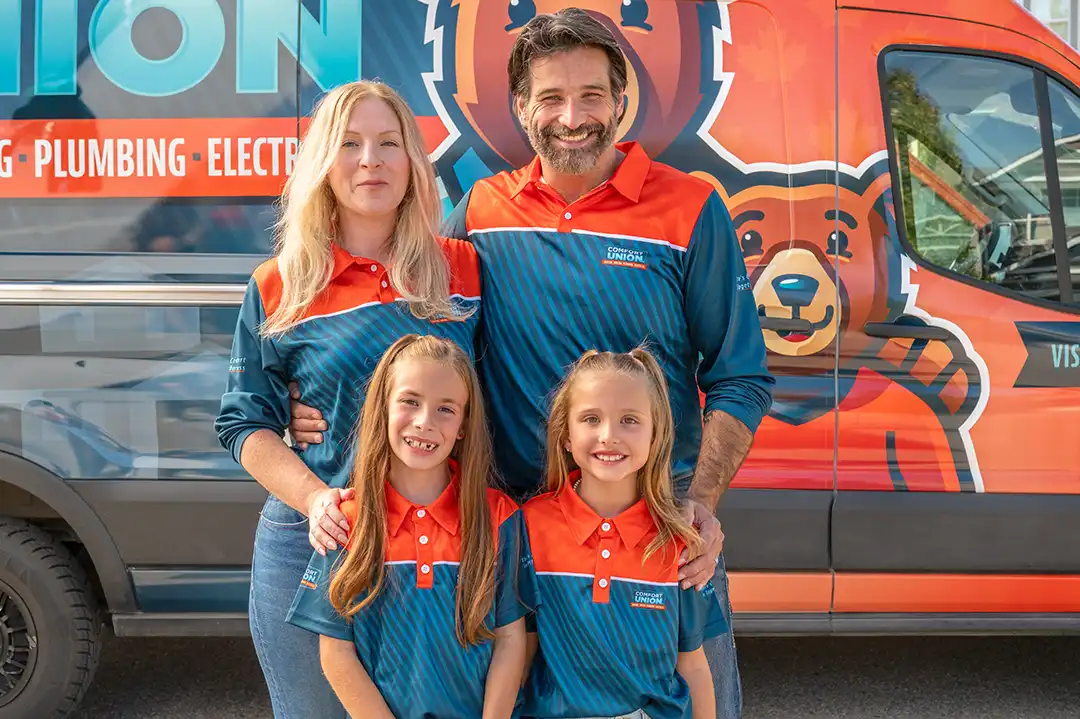
Fast, reliable furnace repair in Calgary. We diagnose and fix all makes and models to restore your home’s warmth quickly and safely.
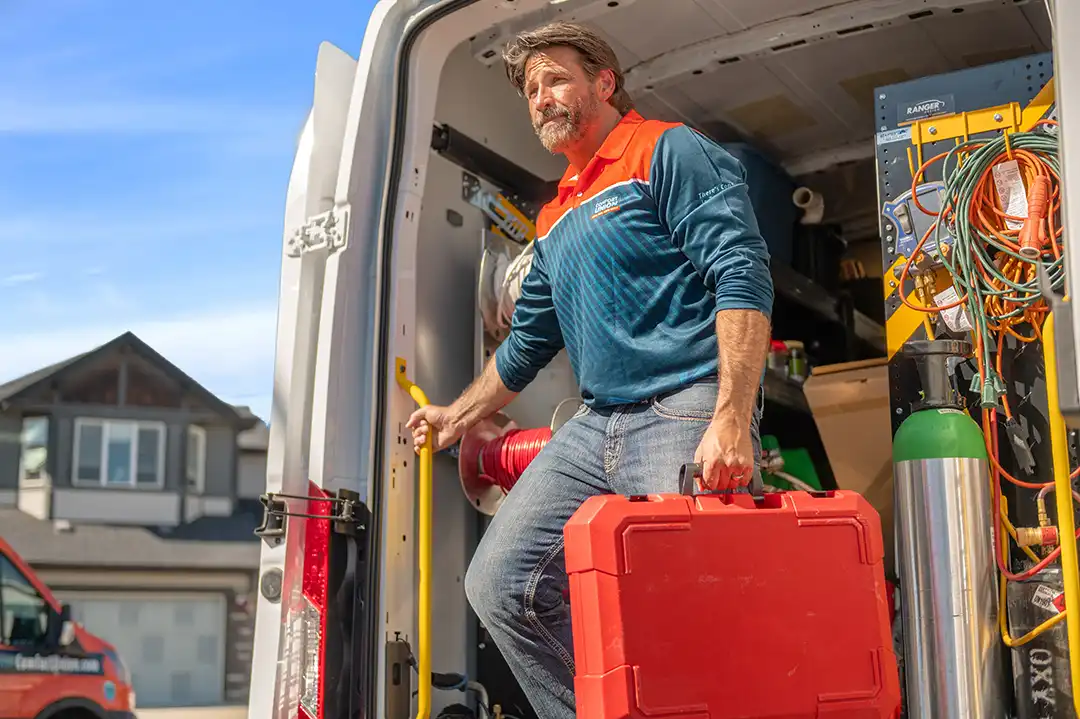
Keep your system running smoothly with a professional furnace tune-up in Calgary. We clean, inspect, and optimize for peak efficiency and safety.

Breathe easier with professional furnace duct cleaning in Calgary. Remove dust, debris, and allergens for cleaner air and better system performance.
